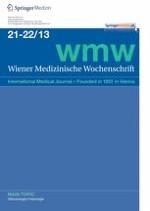Anzeige
01.11.2013 | case report
Triple-negative breast cancer possibly transforming into malignant melanoma due to targeted therapy? A case report and review of literature
Erschienen in: Wiener Medizinische Wochenschrift | Ausgabe 21-22/2013
Einloggen, um Zugang zu erhaltenSummary
Background
Triple-negative breast cancer (TNBC) is characterized by lacking expression of estrogen receptor and progesterone receptor as well as absence of human epidermal growth factor receptor 2 overexpression and is an aggressive clinical phenotype.
Patients and methods
We report the case of a 33-year-old woman who has been treated using a targeted approach for TNBC and developed a malignant melanoma metastasis without any primary.
Results and conclusion
Using targeted therapies, tumors can be treated much more effectively, but up to now, we do not know much about potential adverse reactions. Due to the targeted therapy, tumors may be pressurized for transformation. We call for further investigations to rule out the potential risks of targeted therapy in TNBC. This is the first report of a potential transforming of one tumor entity to another by a targeted therapy.
